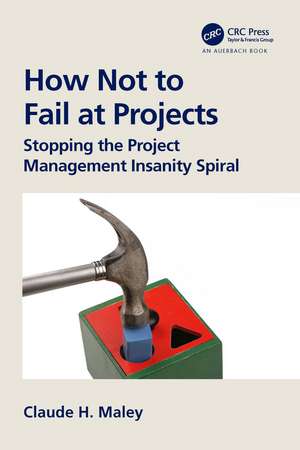How Not to Fail at Projects: Stopping the Project Management Insanity Spiral
Autor Claude H. Maleyen Limba Engleză Paperback – 3 iun 2024
- The first sanity check is how and when to appoint a project manager. This first sanity check may be familiar and may well bring back memories of starting a career in project management.
- The second sanity check is the comprehension of why a project is needed. It helps to overcome the misunderstanding that many have on the nature of projects and its management.
- The third sanity check is the understanding of the unknown and emphasizes the importance of risk management.
- The fourth sanity check is capturing who needs what. It is about the constant pursuit to satisfy a host of individuals and at times the, sometimes seemingly, unsurmountable quest to secure resources for a project.
- The fifth sanity check is who does what. It also deals with satisfying stakeholders and obtaining resources.
- The sixth sanity check is outside assistance. It is all about breaking the us versus them syndrome when outsourcing in a project.
- The seventh and most important sanity check is engaging the efforts of others as it deals with people—the lifeblood of any organization.
The book concludes with a chapter on composing and building powerful microservices. With the exponential growth of IoT devices, microservices are being developed and deployed on resource-constrained but resource-intensive devices in order to provide people-centric applications. The book discusses the challenges of these applications. Finally, the book looks at the role of microservices in smart environments and upcoming trends including ubiquitous yet disappearing microservices.
| Toate formatele și edițiile | Preț | Express |
|---|---|---|
| Paperback (1) | 220.12 lei 3-5 săpt. | +5.91 lei 6-12 zile |
| CRC Press – 3 iun 2024 | 220.12 lei 3-5 săpt. | +5.91 lei 6-12 zile |
| Hardback (1) | 692.61 lei 6-8 săpt. | |
| CRC Press – 3 iun 2024 | 692.61 lei 6-8 săpt. |
Preț: 220.12 lei
Nou
Puncte Express: 330
Preț estimativ în valută:
42.12€ • 45.04$ • 35.12£
42.12€ • 45.04$ • 35.12£
Carte disponibilă
Livrare economică 27 martie-10 aprilie
Livrare express 12-18 martie pentru 15.90 lei
Preluare comenzi: 021 569.72.76
Specificații
ISBN-13: 9781032744506
ISBN-10: 1032744502
Pagini: 84
Dimensiuni: 156 x 234 x 8 mm
Greutate: 0.15 kg
Ediția:1
Editura: CRC Press
Colecția Auerbach Publications
Locul publicării:Boca Raton, United States
ISBN-10: 1032744502
Pagini: 84
Dimensiuni: 156 x 234 x 8 mm
Greutate: 0.15 kg
Ediția:1
Editura: CRC Press
Colecția Auerbach Publications
Locul publicării:Boca Raton, United States
Public țintă
Professional Practice & DevelopmentCuprins
1. The First Sanity Check—How and When to Appoint a Project Manager 2. The Second Sanity Check—Comprehension of Why a Project Is Needed 3. The Third Sanity Check—Understanding of the Unknown 4. The Fourth Sanity Check—Capturing Who Needs What 5. The Fifth Sanity Check—Who Does What 6. The Sixth Sanity Check—Outside Assistance 7. The Seventh Sanity Check—Engaging the Efforts of Others
s
s
Notă biografică
Claude H. Maley is the founder of Mit Consultants and a Senior Management & Education Consultant, having started his career as a Systems Engineer with IBM, following reading Estate Management and Building Construction Engineering at the London School of Building. Claude has held senior positions with and for international organisations and companies in organizational management, programme and project management, and sales and marketing.
Descriere
This book aims to analyze the reasons for failure in project management. It is filled with stories, anecdotes and satires that highlight how organizations and project managers fall into an “insanity spiral”. It provides Sanity Checks designed to keep project managers from repeating the same mistakes and to help them become project champions.
